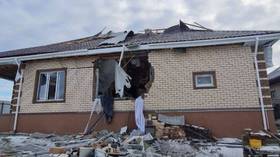Europe keeps Trump’s Israel-Palestine ‘peace plan’ at arms’ length, but other US allies rush to embrace - except Turkey & Jordan

Reactions to US President Donald Trump’s ‘deal of the century’ Israel-Palestine peace plan fell mostly along the lines of existing alliances, with close US allies backing the plan and rivals denouncing it - barring some surprises.
Europe hedged its bets on supporting the deal, weighing the importance of upholding international law against the need to appear loyal to Washington. Germany “welcomed” anything “aiming to inject new momentum” into the “stalled” peace process, but only went so far as to promise to “carefully examine the proposal” and discuss the resulting questions with other EU members. Foreign Minister Helko Mass made a point of referring to the requirement that any “viable two-state solution” take into account not only “legitimate aspirations of both the Palestinians and the Israelis” but “all relevant UN resolutions and internationally agreed upon parameters.” The settlements that appear on Trump’s “conceptual map” of post-deal Israel and Palestine are illegal under international law, as is Israel’s occupation of the Golan Heights.
Also on rt.com ‘Stumbling block for peace’: UN General Assembly calls on Israel to withdraw from Syria’s Golan HeightsThe EU echoed Germany’s statement almost verbatim, putting international law above the Trump plan but promising to consider the latter.
The UK urged both Israel and Palestine to “give these plans genuine and fair consideration, and explore whether they might prove a first step on the road back to negotiations.” Foreign Secretary Dominic Raab waxed poetic about the deal’s ability to “unlock the potential of the entire region, and provide both sides with the opportunity for a brighter future.”
Egypt echoed the hopeful sentiment. “We call on the two parties concerned to study carefully the American vision, find out its dimensions and open channels of dialogue to resume negotiations under American auspices,” the Egyptian Foreign Ministry said in a statement voicing its support for the plan.
The UAE expressed hope that “Palestinians and Israelis can achieve lasting peace and genuine coexistence with the support of the international community,” its embassy to the US stated on Twitter, praising the US effort.
Saudi Arabia joined the chorus of approval, encouraging the start of direct peace negotiations between Palestine and Israel under US supervision. “Saudi Arabia reaffirms its support to all efforts to achieve a just and comprehensive solution to the Palestine issue,” the Saudi Foreign Ministry said n a statement.
Not everyone was pleased, however. Turkey slammed the “stillborn” plan, declaring “Jerusalem is our red line. We won’t allow steps to legitimize Israel’s occupation and oppression.” The Turkish Foreign Ministry called the plan “an attempt to kill the two-state solution” and “a plan aiming to annex Palestinian territory.”
Palestinian people and Palestinian territories cannot be purchased.
Iran eviscerated the plan as “treason of the century,” declaring that “such vicious plans are doomed to failure” and calling for “a referendum among all main residents of the Palestinian land” as the only peaceful solution to the Israel-Palestine crisis. Foreign Ministry spokesman Abbas Mousavi called on “all free nations and governments in the region and across the world” to stand up to the Trump administration. Iran, he said, is prepared to unite with any and all Muslim nations to protect Palestine and the Muslim community despite any minor differences among them.
The so-called "Vision for Peace" is simply the dream project of a bankruptcy-ridden real estate developer. But it is a nightmare for the region and the worldAnd, hopefully, a wake-up call for all the Muslims who have been barking up the wrong tree.#LetsUniteForPalestinianspic.twitter.com/j2CJ9JaH9c
— Javad Zarif (@JZarif) January 28, 2020
Jordan dismissed the Trump plan as inherently flawed, declaring that a Palestinian state with pre-1967 borders and East Jerusalem as its capital was the “only path to peace.”
“The kingdom wants true, just, comprehensive peace on the basis of a two-state solution that ends the occupation that started in 1967 and preserves the rights of the Palestinian people, guarantees the security of all parties, and protects Jordan’s interests,” Foreign Minister Ayman Safadi said in a statement, indicating the matter would be discussed at Saturday’s emergency meeting of the Arab League Council. He warned Israel against trying to “impose new facts on the ground, such as annexation of lands, expansion of settlements in the occupied Palestinian territories, and violation of sanctities in Jerusalem.”
Also on rt.com ‘Jerusalem is not for sale, your conspiracy deal will not pass’ – Abbas reacts to Trump's Middle East peace dealHundreds have already taken to the streets to protest in Jordan, Gaza and the West Bank, according to local media. Demonstrators in Amman are reportedly being joined by Islamist lawmakers.
Trump unveiled the long-awaited “peace plan” between Israel and Palestine on Tuesday. The 180-page deal finalizes Israel’s West Bank settlements and occupation of the West Bank - illegal under international law - in return for a four-year freeze on further settlement-building and a $50 billion aid package to Palestine. Jerusalem remains under Israeli control, while Palestine gets a capital on the outskirts of East Jerusalem, and most Palestinian resources remain under Israeli control. Tel Aviv has embraced the proposal; Ramallah, unsurprisingly, has not.
Like this story? Share it with a friend!













